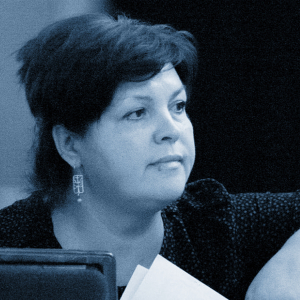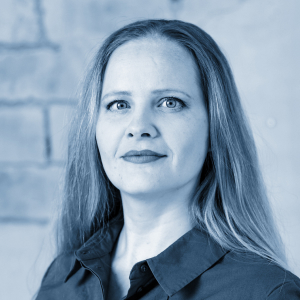Direct speech
Yevgeniya Ignatenko
Science advisor
The idea behind this year’s partes laboratory «Musica Sacrа Ukraina» is to
present the picture of historic development of the Ukrainian partes singing. The
programme includes 10 concerts by Mykola Dyletsky, presented last year at a
concert in St. Sophia Cathedral of Kyiv – one 8-voice, the rest – 4-voice, along
with three anonymous 12-voice concerts from the Kyiv collection, kept at the
Manuscript’s Institute of the Volodymyr Vernadskyi National Library of Ukraine.
All the 12-voice concerts decoded and scored by Yevgeniya Ignatenko will be
performed for the first time. Hence, the presentation will cover:
– Compositions by different authors – Mykola Dyletsky and three anonymous
composers;
- Compositions, created at different times. Dyletsky’s concerts were written in
1670s-1680s, while the 12-voice pieces from the Kyiv collection were
recorded in manuscripts dated 1730s-1740s and 1760s. Hence, they
encompass the time span of 50 years and even more, which can be clearly felt
in their sound.
- Compositions are different by the performers’ set – chamber 4-voice,
traditional 8-voice and grand-scale 12-voice. It is interesting to retrace the
specific features in the style of partes pieces conditioned by the differences in
their sets, since in 4-, 8- and 12-voice singing, the singers have different tasks,
which gives a possibility of experimentalising with different numbers of
performers.
 Dyletsky’s "Musical Grammar" of 1679. Russian State Library. Fund 173.I, № 107.
Dyletsky’s "Musical Grammar" of 1679. Russian State Library. Fund 173.I, № 107.
The 17th century was the age of birth and development of the Ukrainian
professional chorus culture. Composer, singer, conductor and music theorist
Mykola Pavlovych Dyletsky (?1630–1690) was its key figure.
Information about his life and work is very scanty, it is found in the versions
and copies of his treatise «Musical Grammar». Dyletsky studied at the Wilno Jesuit
Academy, as he himself stated in the edition of his «Grammar» created in Moscow
in 1679 to an order of the Russian manufacturer Dmitri Stroganov. It is known that
in 1675 Dyletsky presented the Wilno (present-day Vilnius) City Hall with a piece
of poetry titled «Toga Złota» («Golden Toga»), which, unfortunately, has not
survived. For some time, Dyletsky worked in Smolensk (in 1677, a new version of
his treatise was written in that city), following which, he moved to Moscow.
Dyletsky’s contemporary deacon Ioanikiy Korenev, the author of the polemic work
«Musikia» released in one manuscript with Dyletsky’s treatise «Musical
Grammar», referred to him as a «Kyiv Citizen».
The process of rediscovery of Dyletsky’s heritage began as far back as in the
19th century, with the emergence of music studies as a branch of science, and
continues even now. Initially, Dyletsky was discovered as a scholar, for his treatise
«Musical Grammar». In the second half of the 20th century, Ukrainian musicologist
Nina Herasymova-Persydska discovered the works by Dyletsky as a composer:
three cycles of the Divine Service, the Resurrection Canon and a number of
concerts. Her publication «Mykola Dyletskyi. Choral Pieces» – the first collection
of the composer’s works – was released in Kyiv in 1981. Another piece by
Dyletsky – the concert «Glory / Come here, people», attributed by Nina
Herasymova-Persydska – was also published in Kyiv in 2006 (collection of scores
«Partesny Concertos of the 17th – 18th centuries from the Kyiv Collection»,
prepared for publication by Yevgeniya Ignatenko). Finally, over the past 10 years
Russian musicologists Natalia Plotnikova and Irina Gerasimova discovered and
made public two more liturgical cycles – an evening service and a «requiem»
(funeral liturgy), and at least 16 concerts by that composer. All in all, more than
100 pieces are currently attributed to Dyletsky. Exactly the concerts recently found
in the archives and bearing the name of Mykola Dyletsky represent the composer’s
heritage in the programme. They have never been performed in Ukraine, and the
very fact of attribution of their authorship remains not known to the wide circle of
musicians and music lovers.

Dyletsky’s manuscripts are kept at the Russian National Library in St.
Petersburg (collection of А. Titov, № 932–935). Their publication was prepared by
Irina Gerasimova. Those pieces were included in the publication «Nicolaus
Dylecki, ca. 1630-1690. Vesperae, Liturgia, Concerti quatuor vocum», issued in
Warsaw in the fall of 2018.
Most newly-found concerts by Dyletsky use texts from liturgical
publications of the Orthodox Kyiv Metropolitanate and the Uniate Greek Catholic
Church (except «Thou Heavenly King» and «The Lord is my Enlightenment»,
based on Moscow editions). This prompts the assumption that Dyletsky wrote
those compositions in Rzeczpospolita, before leaving for the Tsardom of Muscovy,
that is, before 1677. They will sound with account of the specific pronunciation of
Church Slavonic texts, widely spread on the Ukrainian and Belarusian soil in the
17 th century.
All concerts, except for «Glory / Come here, people», are 4-voice. By the
voice set, they are rather varied, being a specific feature of the Baroque art. We
used the set with the even filling of the choir range (descant–alto–tenor–bass) that
later became classical, and also the one without the upper voices
(alto–tenor–bass–bass) or with a «hollow» middle (descant–descant–bass–bass,
descant–descant–descant–bass).
 St. Sophia Cathedral in Kyiv
St. Sophia Cathedral in Kyiv
Dyletsky’s music passed an uneasy way to the listeners. In the Soviet times,
it was neither performed nor recorded due to its religious content and church
assignment. Changes began after the breakup of the Soviet Union and declaration
of Ukraine’s independence. Audio recordings of pieces by Dyletsky appeared at
the beginning of the 3 rd millennium, the best known of them were performed by the
«Kyiv» chamber chorus under the baton of Mykola Hobdych, and by «A cappella
Leopolis» ensemble (art director – Roman Stelmashchuk, conductor – Liudmyla
Kapustina).
In his work, Mykola Dyletsky combined the achievements of his
contemporary European music – Italian, German, Polish – with the Slavic melos.
The same idea inspires the performers in our project, who set for themselves the
task of synthesising the best achievements in the interpretation of the European
Baroque music with the traditions of the Ukrainian choral school.
The anonymous 12-voice concerts «Come here, people» and «Sing a New
Song to the Lord» were transcribed from the set of part books 41 П /XVIII–14, that
belonged to the Kyiv-Pechersk Cave Monastery, dated 1760s. That set includes 11
part books out of 12. For some reason, the 12th part book (the part of the 1 st bass)
was marked with the code of St. Sophia’s collection (123/119 C). The concert
«Tribulations of My Heart» is known in two sets: 121/117 С, dated 1730s-1740s
on the basis of its paper, that was obtained by the Manuscript’s Institute of the
Volodymyr Vernadskyi National Library of Ukraine from Kyiv’s St. Sophia
Cathedral, and in the above-mentioned more recent Kyiv-Pechersk Cave
Monastery set 41 П /XVIII–14.
 The page of the third alto’s book. Fund 41 П /XVIII–14. Institute of Manuscript of Vernadsky National Library of Ukraine
The page of the third alto’s book. Fund 41 П /XVIII–14. Institute of Manuscript of Vernadsky National Library of Ukraine
The fact that the same concert was recorded in the manuscripts of Kyiv’s St.
Sophia Cathedral and of the Kyiv-Pechersk Cave Monastery proves that there were
no separate traditions of the Kyiv-Pechersk Cave Monastery or St. Sophia
Cathedral; there was a common singing community. Additionally, recording of the
same concert in the sets of part books created at different times shows that the time
of writing of a set of part books should not be taken as the date of writing of all the
pieces recorded in it.
All the 12-voice concerts – «Tribulations of My Heart», «Sing a New Song
to the Lord» and «Come here, people» – are three-choral (12-voice texture not
always presumes a division into three choruses, but this is exactly the case here),
with three-choral polyphony. All these pieces consist of one part and are based on
the principle of continuous renovation of the musical material and a contrast: tonal,
meter-and-rhythm (alteration of the metric signature – 4\4, 3\4, 3\1, 3\2, 3\8, etc.),
texture (chord, ensemble, imitational presentation), chorus line-up (chorus tutti –
ensembles different by their line-up), etc. The concerts reveal a developed
polyphonic technique, in particular, such sophisticated compositional tools as
three-voice canonical imitations and endless canons.
The Ukrainian partes singing naturally blends into the European context.
Comparison of partes concerts with the Italian (Venetian multichoral
compositions), German (Heinrich Schütz), Polish (Marcin Mielczewski) music has
been in the focus of musical studies and discussions. Meanwhile, partes music
bears national peculiarities, making it possible to speak about the Ukrainian
version of the Baroque music, noted by the known scholar Nina Herasymova-
Persydska. The genre of a partes concert is typologically kindred with the
European church concert (concerto ecclesiastico). The main difference is that the
Ukrainian church music is performed solely a capella, no instruments are used. Its
intonational originality is no less important: you immediately hear that this music
is Ukrainian. National peculiarities of the stylistic concept of a partes concert are
also manifested in the choice of the verbal text.






